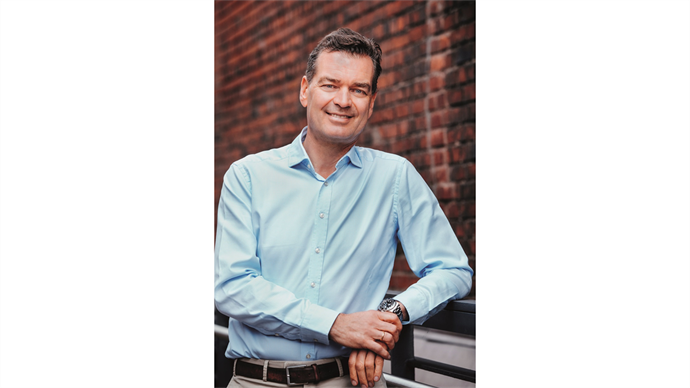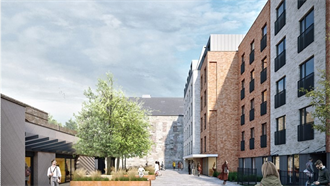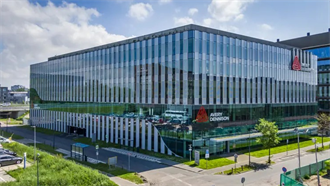Frank Pörschke, CEO of P3 Logistic Parks, discusses his strategies for building the right team at the logistics leader, while attracting talent for future growth.
While the labour shortages of logistics occupiers have been hitting the headlines in recent months, they’re not the only firms struggling with their roster. Low employment availability across Europe has been affecting real estate companies too, as they look to strengthen their teams.
Yet P3 Logistic Parks, one of the most active logistics firms in Europe, currently remains on track with its growth ambitions and is displaying a significant talent for keeping its top people. So, what’s P3’s secret?
Frank Pörschke, the CEO who took the top job at the firm as of 1 April 2021, says his human resources strategy stresses the ‘attractiveness’ of the company while maintaining a fundamentally human-centric approach. ‘Finding talent is tough for many businesses at the moment,’ he says.
‘It’s a particular challenge in a fast-growing industry like logistics which has also struggled to convey its appeal in the past. At P3, we are growing as a company and are looking to add 15%-20% members of staff each year while competing with other firms who are doing the same.
‘Thankfully, the reputation of the logistics trade has changed in recent years. If you go back a few years, the real estate industry wasn’t seen as particularly attractive and logistics and industrial were considered to be even less glamourous. Over the years, that perception has clearly altered.
‘Trends such as ecommerce and technology have made logistics more appealing, and as a company we have also been able to build our name. A business like P3 in the past was only known by a small group of people in this niche sector. But we have learned that its important to build up our profile in order to inform and inspire potential candidates as well.’
International team
P3 currently employs around 230 people across 11 markets, and has a management team of 18 with its head office in Prague, the Czech Republic. The international thread also runs through P3’s personnel, says Pörschke: ‘We have 20 nationalities across our leadership team, from Greece to Malaysia. I think that running our HQ out of Prague also contributes to our internationalism. If we were in Frankfurt, for example, there might be a tendency to build a mostly German team.’
In terms of diversity, P3 has a team which is split 50:50 between men and women. ‘We have less female representation in our upper ranks, but that’s something we’re working on,’ he says. ‘This is a medium-term goal. We are a meritocracy but we want to put the onus on developing our female colleagues. I have a deep belief that diversity is good for the performance of the team.’
He adds: ‘Another way we try to attract diverse talent is by broadening the net of how we find people. We used to rely a lot on our network and individual connections – we are now widening this to include different websites and career resources, to reach people in other places as well.’
Attracting new talent
According to Pörschke, potential employees are often ‘really impressed by P3’s track record… the shareholders, our growth aspirations, our level of growth. And it’s one of the reasons people are keen to join us’. He explains: ‘In a highly competitive environment for the right people, we are seeing positive results. We want to attract people by giving them a lot of responsibility; giving them a chance to grow, in an entrepreneurial context, combined with institutional stability. Good people attract good people – so we try to be friendly, attractive and welcoming too.’
One hallmark of working at P3 is its flexible approach. Employees are not required to clock on or clock off at a precise time, and are also able to work remotely two days a week. ‘We generally ask people to come in three days a week, although we can also look at that on a case-by-case basis,’ he says. ‘We pay adequately and try to make it attractive for high-performing individuals to join us.’
Despite the challenges, Pörschke says he is generally satisfied with the talent pool that is coming through educational institutes today, and feels that there are adequate graduates from specialised schools. ‘I also like the Anglo-Saxon approach, where you don’t specialise too soon,’ he says. ‘It can be more important that people are analytically strong and bring learning skills to a role. The bottom line is that people should be ambitious; what you have studied becomes less relevant over time.’
Forward looking
Another way a company like P3 ensures that it is attractive to talent is by taking a pioneering role in the industry as a whole. Pörschke says: ‘Adopting proptech is one way we can show we value our people, as automation can help take care of routine or repeat work, leaving talent to get on with the more interesting stuff.
‘Equally, having the right vision for environmental, social and governance (ESG) matters is also important to the talent pool. We do put the main focus on the E as we are leading with sustainability in our buildings, and we think that we have good governance in place. In terms of tackling S, the social part, I believe it is firstly the right thing to do, and secondly, means a lot to current and future employees.’
He concludes: ‘At the end of the day, attracting talent is important, and keeping that talent is essential. I’d like to think that P3 is a rewarding and interesting place to work – we are really strong on team-building events and having fun together as well. Working hard and playing hard creates a strong family bond which sets us apart from the competition.’


































